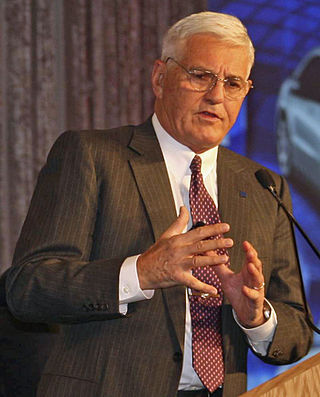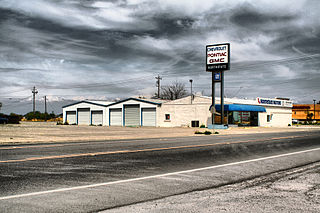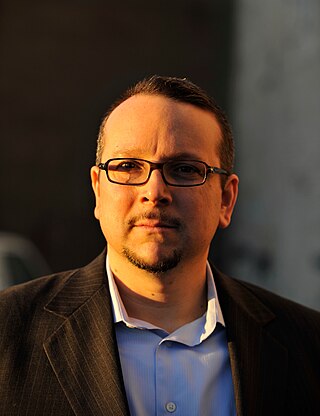
General Motors Company (GM) is an American multinational automotive manufacturing company headquartered in Detroit, Michigan, United States. The company is most known for owning and manufacturing four automobile brands, Chevrolet, GMC, Cadillac and Buick. By sales, it was the largest automaker in the United States in 2022, and was the largest in the world for 77 years before losing the top spot to Toyota in 2008.

Lido Anthony "Lee" Iacocca was an American automobile executive best known for the development of the Ford Mustang, Continental Mark III, and Ford Pinto cars while at the Ford Motor Company in the 1960s, and for reviving the Chrysler Corporation as its CEO during the 1980s. He was president and CEO of Chrysler from 1978 and chairman from 1979, until his retirement at the end of 1992. He was one of the few executives to preside over the operations of two of the United States' Big Three automakers.

Hertz Global Holdings, known as Hertz, is an American car rental company based in Estero, Florida. The company operates its namesake Hertz brand, along with the brands Dollar Rent A Car, Firefly Car Rental and Thrifty Car Rental.

Robert Anthony Lutz is a Swiss-American automotive executive. He served as a top leader of all of the United States Big Three automobile manufacturers, having been in succession executive vice president of Ford Motor Company, president and then vice chairman of Chrysler Corporation, and vice chairman of General Motors.

George Richard "Rick" Wagoner Jr. is an American businessman and former chair and chief executive officer of General Motors. Wagoner resigned as chairman and CEO at General Motors on March 29, 2009, at the request of the White House. The latter part of Wagoner's tenure as CEO of General Motors found him under heavy criticism as the market valuation of GM went down by more than 90% and the company lost more than US$82 billion. He is a board member of ChargePoint, an electric vehicle infrastructure company.

Mark Fields is an American businessman and former chief executive officer of Ford Motor Company. Prior to his July 1, 2014, appointment, Fields served as the company's chief operating officer. Previously, as Ford's president of The Americas, Fields developed "The Way Forward" plan and separately led a significant turnaround of Mazda. He succeeded Alan Mulally as Ford's president and CEO. Fields announced his retirement on May 22, 2017. He currently serves as Senior Advisor at TPG Capital and on several corporate boards, and he previously served as interim CEO of Hertz.
Paul Joseph Ingrassia was an American Pulitzer Prize-winning journalist who served as managing editor of Reuters from 2011 to 2016. He was also an editor at the Revs Institute, an automotive history and research center in Naples, Florida, and the (co-)author of three books. He was awarded the Gerald Loeb Lifetime Achievement Award for financial journalism.
In the United States automotive industry, the term Big Three is used for the country's three largest motor vehicle manufacturers, especially indicating companies that sell under multiple brand names.

Alan Roger Mulally is an American aerospace engineer and manufacturing executive. He served as the CEO of Boeing Commercial Airplanes from 1998 to 2006, and later as president and chief executive officer of the Ford Motor Company from 2006 to 2014.

Sergio Marchionne was an Italian-Canadian businessman, widely known for his turnarounds of the automakers Fiat and Chrysler, his business acumen and his outspoken and often frank approach, especially when dealing with unpalatable issues related to his companies and the automotive industry.

Henrik Fisker is a Danish automotive designer and entrepreneur based in Los Angeles, California. He is best known for designing luxury cars. After working at BMW, Ford, and Aston Martin, Fisker founded Fisker Automotive in 2007. The company failed to meet production deadlines despite significant federal and private investment. Fisker resigned in 2013. The New York Times described the company as the "Solyndra of the electric car industry" and a "debacle". He is currently the CEO of Fisker Inc., which he co-founded with his wife in 2016.
The 2008–2010 automotive industry crisis formed part of the 2007–2008 financial crisis and the resulting Great Recession. The crisis affected European and Asian automobile manufacturers, but it was primarily felt in the American automobile manufacturing industry. The downturn also affected Canada by virtue of the Automotive Products Trade Agreement.

Beginning in the latter half of 2008, a global-scale recession adversely affected the economy of the United States. A combination of several years of declining automobile sales and scarce availability of credit led to a more widespread crisis in the United States auto industry in the years of 2008 and 2009.
The 2009 General Motors Chapter 11 sale of the assets of automobile manufacturer General Motors and some of its subsidiaries was implemented through Chapter 11, Title 11, United States Code in the United States bankruptcy court for the Southern District of New York. The United States government-endorsed sale enabled the NGMCO Inc. to purchase the continuing operational assets of the old GM. Normal operations, including employee compensation, warranties, and other customer services were uninterrupted during the bankruptcy proceedings. Operations outside of the United States were not included in the court filing.

In the United States, the automotive industry began in the 1890s and, as a result of the size of the domestic market and the use of mass production, rapidly evolved into the largest in the world. The United States was the first country in the world to have a mass market for vehicle production and sales and is a pioneer of the automotive industry and mass market production process. During the 20th century, global competitors emerged, especially in the second half of the century primarily across European and Asian markets, such as Germany, France, Italy, Japan and South Korea. The U.S. is currently second among the largest manufacturers in the world by volume.

The history of Chrysler involves engineering innovations, high finance, wide alternations of profits and losses, various mergers and acquisitions, and multinationalization. Chrysler, a large automobile manufacturer, was founded in the 1920s and continues under the name Stellantis North America.
The Canadian auto industry is closely linked to the U.S., due to the Automotive Products Trade Agreement and later the North American Free Trade Agreement (NAFTA), and is in similar trouble. Canada's 3,500 car dealers, which employ 140,000 people, told the federal and Ontario governments in mid-November they are at risk from the financial crisis; they are asking the national government to help out despite a record year of sales. Ottawa is considering providing financial aid to the Canadian subsidiaries of the Big Three, and possibly auto parts companies as well. The auto industry argued that loan guarantees and other help would try to save tens of thousands of Canadian jobs threatened by the sudden drop in North American car sales. Chrysler Canada has asked for $1 billion in aid, making it the only Canadian arm of the Big Three to make a specific dollar request.

Ford Motor Company is an American multinational automobile manufacturer headquartered in Dearborn, Michigan, United States. It was founded by Henry Ford and incorporated on June 16, 1903. The company sells automobiles and commercial vehicles under the Ford brand, and luxury cars under its Lincoln brand. Ford also owns a 32% stake in China's Jiangling Motors. It also has joint ventures in China, Taiwan, Thailand, and Turkey. The company is listed on the New York Stock Exchange and is controlled by the Ford family; they have minority ownership but the majority of the voting power.

Bryce G. Hoffman is an American author, speaker, strategic advisor and management consultant. A former journalist who covered the automobile industry for The Detroit News, he wrote the Wall Street Journal bestseller American Icon: Alan Mulally and the Fight to Save Ford Motor Company. His latest book, Red Teaming: How Your Business Can Conquer the Competition by Challenging Everything, was published on May 16, 2017.
The Gerald Loeb Award is given annually for multiple categories of business reporting. The "Breaking News" category was first awarded in 2008.













